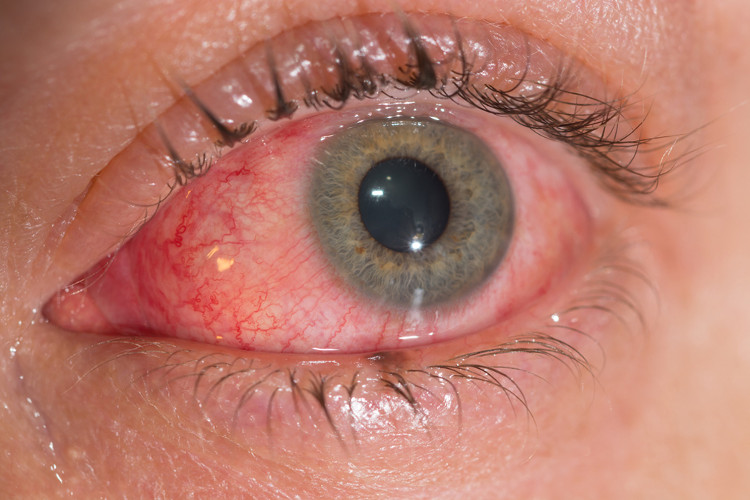Amazing discovery: Zika virus can live in human eyes
A new study published on the Zika virus is published in the September 6 issue of Cell. Accordingly, scientists have discovered Zika virus can live in the human eye and can spread through tears.
Zika virus can live in human eyes
Scientists have examined the effect of Zika infection in the eyes of the fetus, newborn and adult mice.
"Our research shows that the eye can be a reservoir of Zika virus , " said Professor Michael Diamond at Washington University of Medicine and Pharmacy - one of the study's lead authors.
"We need to study whether people with Zika virus cause eye disease and how long it can actually exist , " he added, noting that patients may be infected by tears.
Scientists conducted experiments by transplanting Zika virus into mice through their skin, similar to how humans are infected with Zika by mosquito bites. And they found the Zika virus lived in the rodent's eyes seven days later.

The eye may be a reservoir of Zika virus.(Illustration).
According to the study, it is still unclear how Zika virus infects the eye, but there is a possibility that it passes "the blood retinal barrier separating the eye from the blood, going along the optic nerve end connecting the brain and eyes ".
According to Professor Jonathan Miner, co-author of the study, this suggests that it is more likely that healthy people may be infected with Zika virus when exposed to the patient's tears.
Researchers said that one-third of babies infected with Zika in the fetus suffer from eye diseases such as optic neuritis, retinal damage or blindness.
Meanwhile, in adults, Zika can cause conjunctivitis, and in some rare cases can cause uveitis, a condition in which part of the eye wall is inflamed, and there are can lead to permanent vision loss.
Scientists are also planning to expand this study to people infected with Zika virus.
WHO recommends not having sex for 6 months
Thus, according to the latest announcement of the World Health Organization, as of August 28, 2016, there have been 70 countries and territories recognized the transmission of Zika virus, 11 countries have the transmission from person to person.
Especially in Singapore, the first case of Zika virus infection was announced on August 28, 2016, for 4 days (August 31, 2016) 82 cases were recorded.
Meanwhile, dengue situation is continuing to be complicated and increasing in many countries in the world.

WHO has made recommendations for both men and women who have just moved from the Zika virus region.(Illustration).
Before the situation of Zika virus epidemic continued to increase, yesterday (7/9), the World Health Organization issued a recommendation, avoiding sex for 6 months for people who have just returned from the epidemic.
Accordingly, women and men return from areas where the active Zika virus should take safe sex measures or avoid sexual intercourse for 6 months.
This recommendation applies to all people who have just returned from the epidemic, regardless of whether they have signs of infection.
The World Health Organization's recommendation made many changes compared to the recommendations published on June 7.
Accordingly, these measures only apply to men showing signs of infection, while women and men returning from the epidemic area need only apply safe sex measures for at least 8 weeks.
The World Health Organization also said that 11 countries have reported cases of Zika infection through sexual contact. Meanwhile, more than 65 countries and territories appear new cases of infection caused by local mosquitoes.
- Process of Zika virus testing in Vietnam
- What do people know about Zika?
- Understanding the Zika virus 'eating human brain' is especially dangerous
- Zika virus in Brazil is similar to Zika virus in Asia
- WHO: The latest research on Zika virus is very worrying
- Common questions when Zika virus spread in Saigon
- Translate Zika spread in Saigon
- Vietnam discovered the first 2 cases of Zika virus
- 2.2 billion people live in risk areas into Zika outbreak
- The US discovered the first death due to Zika virus
- 5 basic knowledge everyone should know about Zika virus
- Zika virus spreads 16 districts in Saigon
 Green tea cleans teeth better than mouthwash?
Green tea cleans teeth better than mouthwash? Death kiss: This is why you should not let anyone kiss your baby's lips
Death kiss: This is why you should not let anyone kiss your baby's lips What is salmonellosis?
What is salmonellosis? Caution should be exercised when using aloe vera through eating and drinking
Caution should be exercised when using aloe vera through eating and drinking Understanding the Zika virus 'eating human brain' is especially dangerous
Understanding the Zika virus 'eating human brain' is especially dangerous  Effectively testing the vaccine for Zika virus in monkeys
Effectively testing the vaccine for Zika virus in monkeys  Detecting mosquitoes often can also transmit Zika virus
Detecting mosquitoes often can also transmit Zika virus  Use smartphones to detect early viral diseases from mosquitoes
Use smartphones to detect early viral diseases from mosquitoes  Zika virus can reproduce in the brain of fetuses and placenta
Zika virus can reproduce in the brain of fetuses and placenta  Process of Zika virus testing in Vietnam
Process of Zika virus testing in Vietnam 